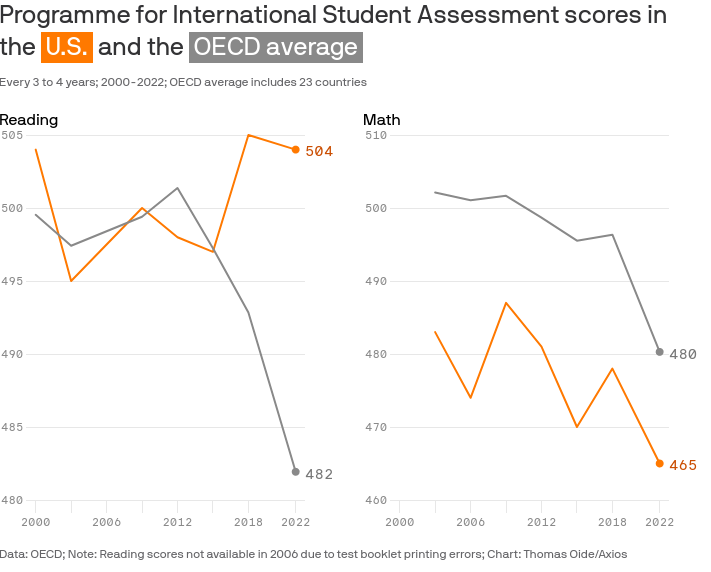
Why it matters: U.S. students saw a 13-point drop in their 2022 Programme for International Student Assessment (PISA) math results when compared to the 2018 exam.
- The 2022 math score was not only lower than it was in 2012 but it was "among the lowest ever measured by PISA in mathematics" for the U.S., per the Organisation for Economic Co-operation and Development (OECD) country note.
Zoom in: While the U.S. scored below the OECD average in math, it managed to score above the OECD average in reading and science.
- The 2022 results found that U.S. students scored one point below their 2018 reading score and three points below their 2018 science score. However, their performances in those areas were higher than in 2012.
The 2018 PISA assessment found that U.S. students straggled behind their peers in East Asia and Europe, per the Washington Post.
What they're saying: In a statement Tuesday responding to the latest results, Education Sec. Miguel Cardona praised the U.S. for moving up in the world rankings but acknowledged "there's much work to be done."
- "We need a math revolution," Cardona said, noting that "math is critical to our global competitiveness and leadership."
Context: PISA examines the proficiency of 15-year-olds in reading, mathematics, and science worldwide.
- The 2022 PISA edition is the first to take place since the pandemic and compares the test results of nearly 700,000 students across 81 OECD member states and partner economies.
- The exam, coordinated by the OECD, was first administered in 2000 and is conducted every three years. Due to the COVID-19 pandemic, the 2021 test was delayed until 2022.
The big picture: 31 countries and economies maintained or improved upon their 2018 math scores, including Switzerland and Japan. Countries that did so shared some common characteristics, including shorter school closures during the pandemic and fewer impediments to remote learning, per the report.
- 10 countries and economies — Canada, Denmark, Finland, Hong Kong, Ireland, Japan, Korea, Latvia, Macao and the U.K. — saw their students score proficiently in all three domains and had "high levels of socio-economic fairness," per the report.
State of play: Multiple studies have highlighted the adverse and stark impact of the pandemic on education.
- One study released earlier this year found that elementary and middle schoolers in the U.S. need months of extra schooling to close pandemic-induced gaps.
- Reading and math scores for elementary school and middle school students have plunged in the wake of the pandemic.
- Data released earlier this year as part of the Nation's Report Card found that U.S. history scores among middle schoolers also plummeted last year to their lowest level ever recorded since the assessment began in 1994.
What to watch: The 2025 PISA assessment will focus on science and have a new foreign language test.
Editor's note: This story has been updated with a statement from Education Sec. Miguel Cardona.
